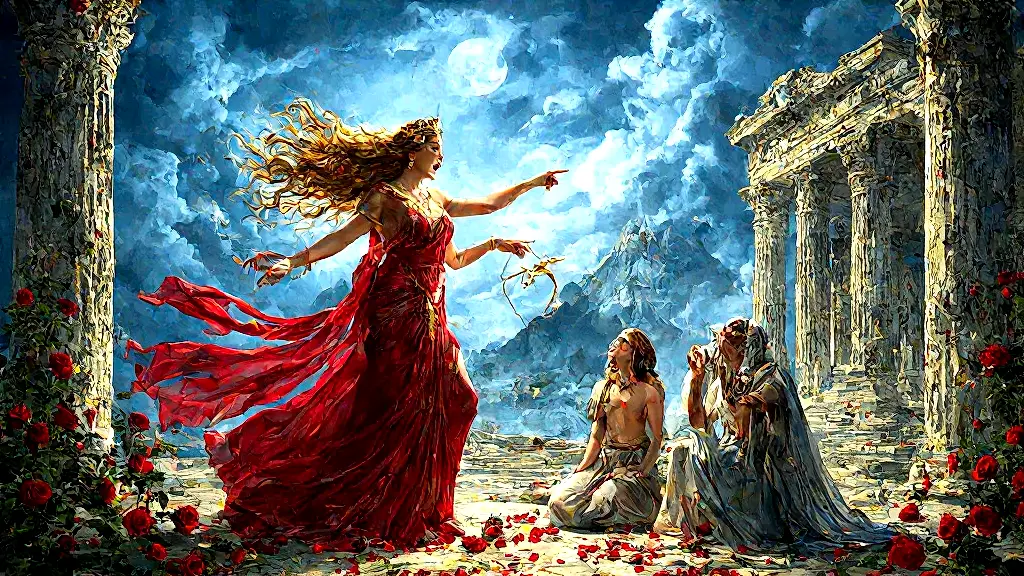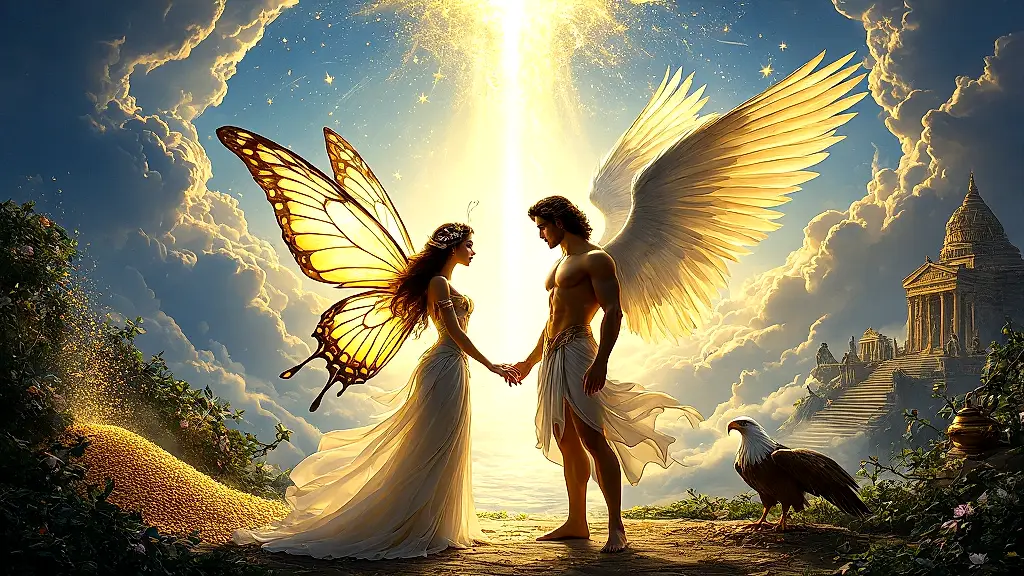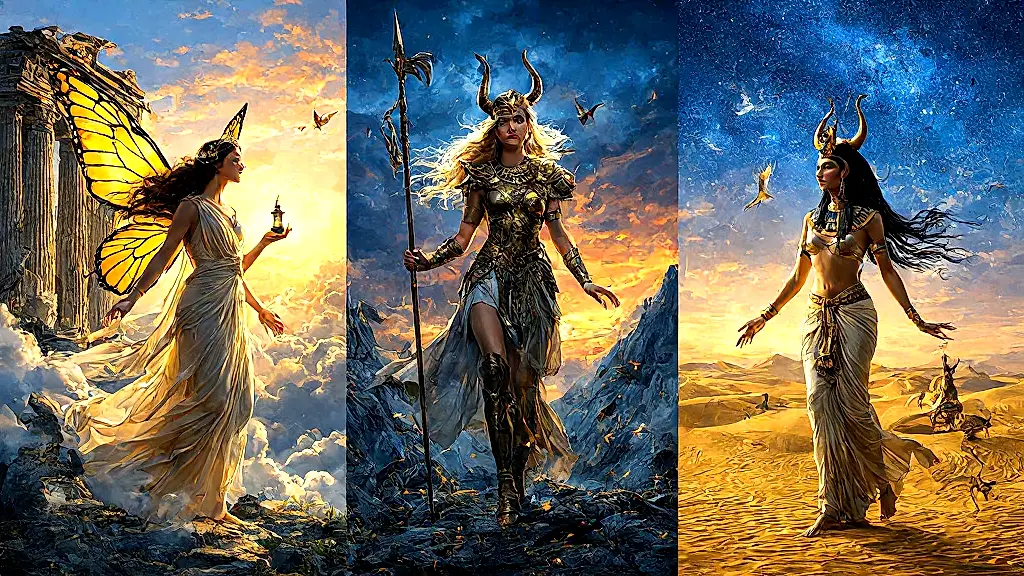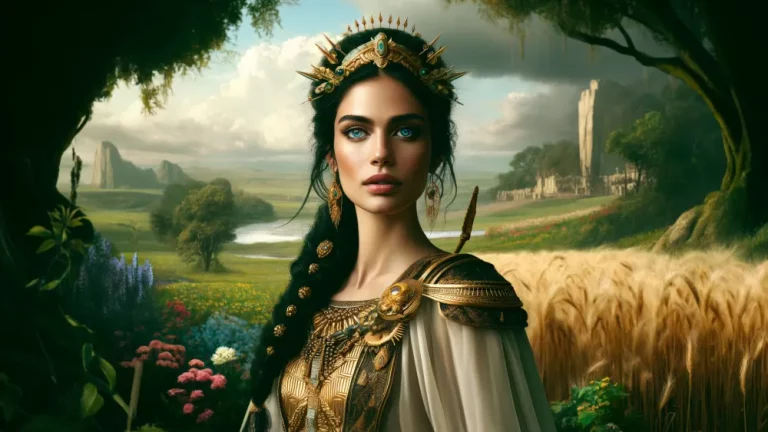Greek Mythology Eros And Psyche: The Timeless Love Story
Do you know how love and the human soul got linked in myths? The story of Eros and Psyche, one of Greek mythology’s most famous love tales, answers this exact idea. At its heart, the myth mixes godly drama with human hardship: Eros (called Cupid in Roman myths), the god of love, falls for Psyche, a mortal woman as beautiful as Aphrodite.
Key Points:
- Eros, the love god, falls for Psyche, a mortal whose beauty rivals Aphrodite’s, sparking jealousy.
- Aphrodite orders Eros to make Psyche love a monster, but he cuts himself with his own arrow and loves her instead.
- Psyche and Eros marry in secret, but she breaks the rule by looking at him, causing him to leave.
- To win Eros back, Psyche faces four deadly tasks set by Aphrodite, like sorting grains and fetching underworld water.
- After completing the tasks, Zeus makes Psyche a goddess, and they reunite at a divine wedding.
- The story means love and the soul must overcome struggles to stay together, with trust and hard work.
- Artists and writers, from ancient Rome to the Renaissance, have retold and painted their story many times.
However, this isn’t only a love story. It also includes jealousy, near-impossible challenges, and a final reward. The story first appeared in the 2nd century CE in Apuleius’ The Golden Ass. Older versions, like Hesiod’s Theogony, describe Eros as an ancient force, not just Aphrodite’s playful son. Psyche’s name means “soul” in Greek. This shows she represents humanity’s spirit, while Eros stands for divine love.
As we’ll see, her journey – from being cast out as a mortal to becoming a goddess – reflects old beliefs about struggle and fate. Want to hear about Aphrodite’s anger, hidden weddings, and challenges no human should face? Let’s start.
Greek Mythology Eros And Psyche: Overview and Key Facts
| Aspect | Details |
|---|---|
| Primary Source | The fullest version comes from Apuleius’ The Golden Ass, written around the 2nd century CE. However, older texts like Hesiod’s Theogony describe Eros in another way. |
| Eros’ Role | He was the god of love and desire. Hesiod saw him as an ancient cosmic force, but later myths (like Ovid’s) made him Aphrodite’s son. His arrows made people love or hate each other – they worked like early matchmakers. |
| Psyche’s Role | Psyche was a mortal princess. Her beauty made Aphrodite jealous. Her name means “soul,” representing how the human soul seeks connection with a higher love. |
| Central Conflict | Aphrodite grew angry because people worshipped Psyche. She told Eros to make Psyche love a monster, but he fell for her instead – an unexpected turn of events caused by the gods. |
| Key Themes | The story explores love against jealousy, humans versus gods, and challenges that test loyalty. It resembles modern forbidden love stories, but with divine consequences. |
| Cultural Impact | Artists like those in the Renaissance painted scenes from the myth. Writers such as C.S. Lewis retold it (Till We Have Faces). Even psychology borrowed the word “psyche.” Later, we’ll see more examples. |
| Ambiguities | Different sources disagree about Eros’ origins. Some versions leave out Psyche’s sisters or make her tasks simpler. Always note which tradition a retelling uses. |
Where Eros and Psyche Came From
To get why their love story became famous, we need to look at where they started. One was divine, the other mortal, and both have beginnings that myths don’t fully explain.
Eros: Ancient Power or Aphrodite’s Kid?
Greek myths actually give us two completely different versions about Eros. In Hesiod’s Theogony (8th-7th century BCE), Eros appears as a primordial deity, one of the first beings that came from Chaos along with Gaia (Earth) and Tartarus (the Abyss).
Here he wasn’t a god with personality, but more like a natural force that brought things together – he functioned similarly to how gravity works. However, when we get to Roman times, writers like Ovid (Metamorphoses, 1st century CE) described Eros as Aphrodite’s playful son, a winged boy whose arrows made people fall in love. This change shows how stories transform over time, mixing old ideas with new ways of thinking.
| Aspect | Hesiod’s Theogony (Ancient Version) | Ovid’s Metamorphoses (Roman Version) |
|---|---|---|
| Origin | Came from Chaos before other gods existed | Son of Aphrodite (Venus), often with Mars as father |
| Role | Natural force that created connections | Human-like prankster who played with people’s lives |
| Depiction | No physical form, just a concept | Young boy with wings and arrows (later called Cupid) |
| Cultural Shift | Shows early Greek creation beliefs | Roman preference for gods that acted like people |
Eros’ transformation from cosmic force to character demonstrates how myths adapt – starting as big ideas about the universe, then becoming stories with real drama and personality. Next we’ll see how Psyche, a human woman, got involved with this complicated god.
Eros changed from being a cosmic force in early Greek myths to a playful winged boy in Roman stories, revealing how myths evolve over time.
Psyche: The Mortal Who Outshone the Gods
Psyche was so beautiful that people stopped worshiping Aphrodite to admire her instead – which was always risky when dealing with Greek gods. Unlike other famously beautiful mortals like Helen of Troy, Psyche’s appearance seemed almost divine in nature. She became the only mortal woman ever to receive the kind of worship normally given to goddesses.
This mixing of human and godly status started her unusual story, which her name hints at: “Psyche” means “soul” in Greek, showing her tale represents more than just looks. Ancient writers like Apuleius explain how Psyche’s beauty actually caused problems, which led to her becoming isolated. Her sisters married kings, but Psyche stayed unmarried because no man dared approach someone who seemed nearly divine.
This dangerous situation – a beautiful woman untouched by love – eventually drew the attention of the gods, especially Aphrodite, who saw Psyche’s followers as personal insults. Everything was now ready for a clash that would push mortal limits against divine power.
Aphrodite’s Rage and the Oracle’s Warning
When Aphrodite heard people were leaving her temples to worship Psyche, she became absolutely furious. Ancient texts describe her as being extremely angry. This went beyond simple jealousy – in Greek belief, gods needed human worship to maintain their power, so Psyche’s popularity became a direct threat to her authority.
Aphrodite then ordered her son Eros to make Psyche fall in love with the most horrible creature imaginable, which would humiliate both the princess and those who admired her. Psyche’s worried parents asked the Oracle of Apollo for help, and received a truly frightening prophecy. Their daughter had to wear funeral clothes and wait alone on a mountain to marry “a monster that even gods fear.”

The oracle’s words were unclear on purpose – the Greek term “teras” could mean either an actual monster or a powerful divine being. These kinds of scary predictions appeared often in Greek myths, where they seemed cruel but usually hid some good outcome, similar to how warnings in stories often precede unexpected turns. What makes this situation especially sad is how it shows the Greek concept of divine jealousy.
The gods regularly punished humans for hubris – not just pride, but any behavior that made mortals seem too much like gods. Psyche’s mistake wasn’t vanity (she never asked to be worshipped), but simply being a human whose beauty equaled the gods’.
This creates strong dramatic irony, since readers who know about Eros understand who the “monster” really is long before Psyche figures it out.
Their Secret Romance
What was supposed to be a death sentence actually became something completely different – a secret romance that developed unexpectedly. There on that isolated mountain, Psyche’s situation changed in ways that surprised everyone involved.
The Hidden Marriage: Eros in Disguise
Eros came to the mountain ready to follow his mother’s harsh orders – to make Psyche love a horrible creature. But then something unexpected happened: as he leaned over the sleeping Psyche, he accidentally cut himself with his own golden arrow. Ancient writers tell us this was important because Eros, who normally made others fall in love, suddenly felt that same powerful love himself.
He became completely devoted to Psyche against his original plan. This accident led to a very unusual marriage. Eros, now deeply in love, took Psyche to a magical palace where they lived as husband and wife with one strict rule: she could never look at his face. They only met at night in complete darkness, with Eros leaving before sunrise.
There were two reasons for this rule: it hid Eros’ identity from Aphrodite, and it kept their relationship mysterious. The palace had invisible servants who took care of everything, making sight unnecessary to experience comfort and love. Although Psyche had every luxury and knew Eros loved her, she could only hear his voice and feel his touch.
This invisible relationship shows how mortal understanding has limits when dealing with divine matters. Their situation worked well until Psyche’s natural human curiosity eventually made her want to break the rule and see her husband’s face.
When Psyche Broke the Rules and Eros Left
Psyche’s sisters, who were extremely jealous of her luxurious life, convinced her to doubt her invisible husband. They suggested he might be the monstrous serpent from the prophecy. One night, Psyche took an oil lamp and knife to look at her sleeping husband. Instead of a monster, she saw the unexpectedly beautiful god of love.
However, when a drop of hot oil fell on Eros’ shoulder, he woke up and left after saying: “Love cannot live with suspicion.” What happened next shows a clear example of broken trust. Eros didn’t just leave – he ended their divine connection. The palace disappeared immediately, which left Psyche alone and pregnant to face Aphrodite’s wrath. People in ancient times would recognize the meaning here.
When Psyche chose visual proof over faith, she lost her special relationship with the gods. Now she had to continue her journey through hard work instead of easy happiness.
Psyche’s Tough Tests and Happy Ending
Psyche was left alone and heartbroken, facing two options: give up or begin a difficult journey to win back Eros. What came next would challenge her mentally, physically, and emotionally in ways few humans ever experience.
Aphrodite’s Four Crazy Challenges
Aphrodite gave Psyche four extremely difficult tasks, each more dangerous than the last. The first was to separate a huge pile of mixed grains that included wheat, barley, millet, lentils, and beans. While this would take humans months, some helpful ants did it overnight. This showed that even Aphrodite’s harsh tests could sometimes be overcome with assistance.
The next challenges were even harder:

- Golden Wool: Psyche needed wool from man-eating sheep near a dangerous river. A talking reed told her to collect wool caught on bushes when the sheep slept.
- Stygian Water: Aphrodite wanted water from the highest waterfall of the River Styx, where deadly serpents lived. Zeus’ eagle helped by getting the water for her.
- Underworld Journey: The final task was getting Persephone’s beauty box from Hades. Psyche got specific rules: ignore suffering souls, pay Charon with two coins, and most importantly – don’t open the box.
The underworld trip was the most dangerous. Psyche faced many risks but almost failed at the end when she opened the box out of curiosity. Instead of beauty, it contained deadly sleep. Each test examined different qualities – from accepting help to following instructions carefully.
Psyche faced four deadly tasks from Aphrodite, like sorting grains and stealing wool from killer sheep, where help from ants and other creatures got her through, but she nearly died when curiosity made her open a forbidden box from the underworld.
Zeus Steps In and Psyche Becomes a Goddess
When Eros recovered from his injury, he went to Mount Olympus to ask Zeus for help. Zeus, who was impressed by their relationship and possibly tired of Aphrodite’s anger, gave Psyche ambrosia to make her immortal. This drink changed her mortal body into one that would last forever.
After this, their wedding became a lavish celebration that all the gods attended. Even Aphrodite came, though she wasn’t completely happy about it. In Greek thought, this marriage showed how love and the soul could work together. The fact that all the gods came proved they accepted Psyche into the divine hierarchy.
Why Eros and Psyche Still Matter
The story of Eros and Psyche has lasted for thousands of years because it shows us important things about relationships, not giving up, and personal change. People still find this ancient love story interesting today because these themes remain just as relevant now as they were in the past.
What the Story Really Means: Love, Soul, and Hard Work
While it seems like a love story, the Eros and Psyche myth actually tells us about deeper things. Their names show this – “Psyche” means both soul and butterfly, which represents change, while “Eros” stands for love in a broader sense. Some ancient thinkers believed their story showed how people can improve themselves through difficult tasks and help from the gods.

Psyche’s four trials each teach important lessons: sorting grains shows how to choose what matters, getting golden wool teaches patience in danger, collecting Styx water proves we sometimes need help, and the underworld trip means facing fears. These tasks help overcome human weaknesses, similar to how practice makes someone better at something. Even Psyche’s mistake with the box has meaning – it shows some things remain mysterious.
This explains why different religions found value in the story.
Eros and Psyche in Books and Art
The story of Eros and Psyche has inspired artists for over 2000 years, with each period showing it in their own way. The oldest complete version appears in Apuleius’ Metamorphoses (also called The Golden Ass), which was written around 170 CE and includes the tale as a long symbolic story. Many artists chose to show key scenes, like when Psyche looks at Eros with her lamp or gets help during her tasks. Here are some important examples:
- Ancient World: Roman stone coffins from the 3rd century CE that show Psyche’s trials, now kept in the Vatican Museums
- Renaissance: Raphael’s wall painting The Wedding of Cupid and Psyche (1517-18) in Rome’s Villa Farnesina
- Baroque: Canova’s marble statue Psyche Revived by Cupid’s Kiss (1787-93), which you can see in the Louvre
- Modern Era: Edward Burne-Jones’ Cupid and Psyche paintings (1865-87), done in the Pre-Raphaelite style
Similar Stories from Other Cultures
The story of Psyche’s challenges and marriage to a god follows a pattern seen in myths worldwide, showing common human worries about love, change, and not giving up. Although the stories differ, they share important parts: a regular person’s special journey, help from magical beings, and becoming something greater.
The Norse tale of Sigurd finding the Valkyrie Brynhild and Egyptian stories about Hathor moving between worlds both resemble Psyche’s story, proving various cultures told similar tales.
| Story Element | Greek (Eros and Psyche) | Norse (Sigurd and Brynhild) | Egyptian (Hathor’s Journeys) |
|---|---|---|---|
| Supernatural Lover | Eros (Cupid) | Brynhild (Valkyrie) | Hathor (Sky Goddess) |
| Mortal Trials | Sorting grains, golden wool, underworld task | Killing a dragon, fire challenge | Seven prophecies, desert travels |
| Divine Help | Ants, reed, eagle | Odin’s advice | Thoth’s knowledge |
| Forbidden Sight | Lamp shows Eros | Sigurd sees Brynhild clearly | Hathor’s true appearance |
| Transformation | Psyche becomes a god | Sigurd learns runes | Hathor accepts both sides |
This shows that the same basic ideas were important across ancient cultures, with each changing the story to fit their beliefs.
The Greek version focuses on love changing people, the Norse on heroic acts, and the Egyptian on balancing opposites – but all share the journey from human limits to greater understanding.

Different cultures told similar stories about ordinary people facing challenges, getting magical help, and becoming something greater, each fitting their own beliefs.
FAQs
1. Why did Aphrodite hate Psyche?
Aphrodite hated Psyche because mortals worshipped Psyche’s unmatched beauty, eclipsing the goddess’s own divine allure.
2. What is the moral of Eros and Psyche’s story?
The moral of Eros and Psyche’s story is that true love requires trust, perseverance, and the willingness to endure trials for spiritual union.
3. How did Psyche become immortal?
Psyche became immortal when Zeus granted her divinity after Eros pleaded for her to be welcomed among the gods.
4. Are there temples dedicated to Psyche?
Temples dedicated to Psyche are not attested in ancient sources, as her worship was largely symbolic rather than cultic.







